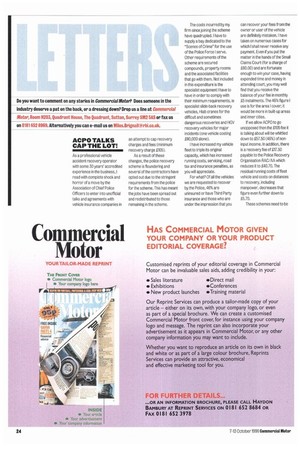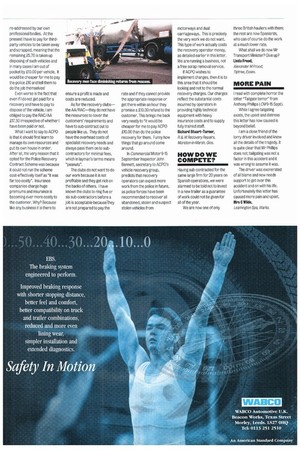Do you want to comment on any stories in Commercial
Page 26

Page 27

If you've noticed an error in this article please click here to report it so we can fix it.
Motor? Does someone in the industry deserve a pat on the bad, or a dressing dovmP Drop us a line at Commercial Motor, Room H203, Quadrant House, The Quadrant, Sutton, Surrey SM25A8 OP fax us on 01816528969. Alternatively you can e-mail us on Miles.Brignall@rbi.co.uk.
ACPO TALKS CAP THE LOT!
As a professional vehicle accident recovery operator with some 30 years' accredited experience in the business, I read with complete shock and horror of a move by the Association of Chief Police Officers to enter into unofficial talks and agreements with vehicle insurance companies in an attempt to cap recovery charges and fees (minimum recovery charge /105), As a result of these changes, the police recovery scheme is floundering and several of the contractors have opted out due to the stringent requirements from the police for the scheme. This has meant the jobs have been spread out and redistributed to those remaining in the scheme. The costs incurred by my firm since joining the scheme have quadrupled. I have to supply a bay dedicated to the "Scenes of Crime" for the use of the Police Force I serve. Other requirements of the scheme are secured compounds, property rooms and the associated facilities that go with them. Not included in this expenditure is the specialist equipment I have to have in order to comply with their minimum requirements, ie specialist slide-back recovery vehicles, Hiab cranes for the difficult and sometimes dangerous recoveries and HGV recovery vehicles for major incidents (one vehicle costing 180,000 alone).
I have increased my vehicle fleet to triple its original capacity, which has increased running costs, servicing, road tax and insurance penalties, as you will appreciate.
For what? Of all the vehicles we are requested to recover by the Police, 46% are uninsured or have Third Party insurance and those who are under the impression that you can recover your fees from the owner or user of the vehicle are definitely mistaken.lhave taken on numerous cases for which I shall never receive any payment. Even if you put the matter in the hands of the Small Claims Court (for a charge of £80.00) and are fortunate enough to win your case, having expended time and money in attending court, you may well find that you receive the balance of your fee in monthly £5 instalments. The 46% figure I use is for the area I cover; it would be more in built-up areas and inner cities.
If we allow ACPO to go unopposed then the £105 fee it is talking about will be whittled down to £57.50 (46%) of noninput income, In addition, there is a recovery fee of £17.50 payable to the Pace Recovery Organisation RAC/AA which reduces it to £40.70. The residual running costs of fleet vehicle and costs on distances to recovery, including manpower, decreases that figure even further down to 15.70.
These schemes need to be re-addressed by our own professional bodies. At the present I have to pay for thirdparty vehicles to be taken away and scrapped, meaning that the remaining 25.70 is taken up disposing of such vehicles and in many cases I am out of pocket by £10.00 per vehicle. It would be cheaper for me to pay the police £10 and tell them to do the job themselves!
Even worse is the fact that even if I do not get paid for a recovery and have to pay to dispose of the vehicle, I am obliged to pay the RAC/AA £17.50 irrespective of whether I have been paid or not.
What I want to say to ACPO is that it should first learn to manage its own resources and put its awn house in order. After all, the very reason that it opted for the Police Recovery Contract Scheme was because it could not run the scheme cost-effectively itself as "it was far too costly. Insurance companies charge huge premiums and insurance is becoming ever more costly to the customer. Why? Because like any business it is there to ensure a profit is made and costs are reduced.
As for the recovery clubs— the AA/RAC—they do not have the resources to cover the customers' requirements and have to sub-contract out to people like us. They do not have the overhead costs of specialist recovery needs and always pass them on to subcontractors for minimal fees, which in layman's terms means "peanuts".
The clubs do not want to do our work because it is not profitable and they get rich on the backs of others. I have known the clubs to ring five or six sub-contractors before a job is acceptable because-they are not prepared to pay the
rate and if they cannot provide the appropriate response or get there within an hour they promise a £10,00 refund to the customer. This brings me back very neatly to "it would be cheaper for me to pay ACPO £10.00 than do the poke recovery For them. Funny how things that go around come around.
In Commercial Motor9-15 September Inspector John Bennett, secretary to ACPO's vehicle recovery group, predicts that recovery operators can expect more work from the police in future, as police forces have been recommended to recover all abandoned, stolen and suspect stolen vehicles from motorways and dual carriageways. This is precisely the very work we do not want. This type of work actually costs the recovery operator money, as detailed earlier in this letter. We are running a business, not a free scrap removal service.
If ACPO wishes to implement changes, then it is to this area that it should be looking and not to the normal recovery charges. Our charges reflect the substantial costs incurred by operators in providing highly technical equipment with heavy insurance costs and to supply fully trained staff.
Richard Stuart-Turner, W Recovery Repairs, Moreton-in-Marsh, Glos.




















































































































